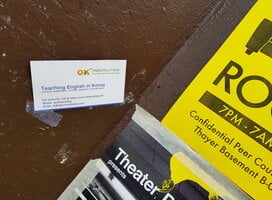Teach English in South Korea
If you’re looking for plenty of adventure, great food, and rewarding, money-saving teaching opportunities, consider teaching English in South Korea. In both your personal and professional life, you’ll experience something new every day, like visiting Buddhist temples hidden deep in morning fog, walking through Seoul’s bustling neon-lit streets, and taking part in cultural customs.
As you explore the sights of South Korea, you can also save up a large chunk of cash as an ESL teacher, as the average salary for teaching in South Korea can range between $1,350-$3,100 USD per month, depending on the institution.
Interested in learning about how to teach English in South Korea? Keep reading to learn more about the types of teaching jobs, average salaries and benefits, and tips for getting a teaching job!
There are many different types of ESL teaching jobs in South Korea, all with varying application requirements, work schedules, benefits, and pay. Regardless of the type of English teaching job you're interested in, it is required, or at least highly recommended, that you're TEFL certified.
Read on to find the option that best fits your skill level and ideal teaching environment.
Government-sponsored programs
Benefits such as higher job security, furnished housing, and paid vacation makes working in a public school an ideal teaching opportunity for many first-time ESL teachers. While these positions tend to be more competitive with slightly lower pay, your application will be made stronger by having a teaching certificate like your TEFL or TESOL.
You’ll work alongside a co-teacher, coordinating classroom instruction times, and even create lesson plans. Public schools hire about six months before their start dates; the beginning of March and September. Pay starts at $1,350-$2,700 USD. The various government-sponsored programs are: SMOE, GEPIK and EPIK.
EPIK program, which stands for English Program in Korea is organized by the Korean ministry of education and places teachers in elementary and middle schools all throughout South Korea. In recent years, the other major government-sponsored programs SMOE and GEPIK merged with the EPIK program and now all share the same application.
The SMOE program, renamed to EPIK-Seoul, places teachers into public schools throughout Seoul, the capital city of South Korea. GEPIK is located in the Gyeonggi Province—the rural area surrounding Seoul.
Recruitment companies
In South Korea, applying to teaching programs through a recruitment company is encouraged to secure your placement. Once you register, they will send you information about job openings, ensure you have the proper certifications, and walk you through the application and interview process.
Universities
Most people begin teaching at universities once they've taught in South Korea for at least a year and have made contacts. However, if you have a master’s degree, you qualify for teaching at the university level. Extremely low working hours and equal pay make working at universities very appealing. You can earn between $2,050-$3,100 USD per month.
However, unlike starting work at a public or private school, at a university level job, you will need to find your own apartment. You'll also have to provide the key deposit for your apartment, a deposit on average of about $5,000 USD that'll be returned to you at the end of your lease -- a potentially huge expense for teachers who are relocating from abroad.
Private schools
Private schools can be a great option if high pay, easy application process, pre-planned lesson plans, and shorter work days are a high priority for you. Private schools, called hagwons, are an excellent option for teachers looking to spend a year abroad and save as much money as possible.
Starting pay at hagwons is usually about $2,000 - $2,200 USD/month with a workweek of about 35 hours. In addition to shorter working hours, most hagwons have pre-prepared lesson plans for teachers and start later in the day, typically after 1pm.
Hagwons typically hire year-round, usually through recruiters.
On average, an English teacher's monthly salary in South Korea is between $1,350 - $4,400 per month, which is among the highest salaries for ESL teachers in the world! The salaries typically vary by teaching institution, location, and teaching experience.
Common teacher benefits
Below are some of the benefits you can expect while teaching English in South Korea:
- Housing
- Flight reimbursement
- Health insurance
- Contract renewal bonus
- Paid vacation
Read more: How Much Money Can You Save Teaching Abroad?
Cost of living in South Korea
Overall, the cost of living in South Korea is affordable, but if you live in a bigger city, the cost can get a bit more expensive. However, since most teaching jobs cover your apartment's cost and all you have to take care of is your utilities and cell-phone bill, it’s safe to say that 80% of your paycheck can be used for living or traveling expenses. The most enticing part of the deal comes when you finish your English teaching contract, as most contracts provide an extra month’s bonus upon completion. This means that the last time you get paid, you actually get paid twice!
Depending on how much you want to work and how frugal you are with your money, you can travel and save during your time teaching in South Korea.
- Food: $80 - $100 (depends on how much you eat out or spend on groceries)
- Transportation: $43.28 for a monthly public transportation pass
- Entertainment (movies, bars/clubs, etc): $68 - $80
- Housing: ~$810 one bedroom apartment in the city center
Source: Numbeo
Seoul and Busan provide the most popular settings for English teachers in South Korea. With its vibrant nightlife, trendy restaurants, and stunning palaces, the capital city, Seoul, offers the most eclectic mix of options in South Korea. A quieter city bordering the Sea of Japan, Busan—home to the popular vacation spot, Haeundae beach—is a bit more low-key and provides a nice compromise between busy and relaxed.
If you’re taking this year to reflect in peace and quiet, consider Gyeongju, a small city with a big lotus pond and a rich historical heritage. No matter your taste, there is a multitude of jobs to teach in cities across South Korea. Public schools typically hire at the start of their semester, March 1st and September 1st, and accept applications six months prior. Private institutes hire year-round.
It is highly encouraged to find and apply for teaching jobs through a recruitment company, which you can find right here at Go Overseas just scroll down to compare all of the programs in South Korea! Our international teaching job board is also a great place to start finding jobs if you have your certifications and/or prior experience teaching abroad.
When to apply
Public schools typically hire at the start of their semester, March 1st and September 1st, and accept applications six months prior. Private institutes hire year-round.
Common qualifications
The qualifications for ESL jobs in South Korea may vary depending on which institution you apply for. Below are the basic, common qualifications for becoming an English teacher in South Korea:
- Bachelor’s degree from an accredited university
- Teaching experience and training – TEFL, TESOL, CELTA (not required, but highly recommended)
- Be a native English speaker
- Clear criminal record
Read more: What are the Requirements to Teach English Abroad?
Working Visas in Korea:
Most foreigners working at public or private schools qualify for the school-sponsored E-2 visa. The E-2 visa will permit you to teach in South Korea for a year with a single entry. For a fee, you can get your single entry status changed to multiple entries, allowing you the option to travel in and out of the country.
Once all of your documents are completed and you receive your visa confirmation number, you will need to either mail or deliver your passport to your local Korean consulate so it can be stamped with your visa. When you've been cleared, your school will help you obtain a residency permit within 90 days. To learn more about Korean visas, visit VISA HQ.
Teaching Programs in South Korea
Pagination
What People Are Saying
New Teaching Jobs
View the latest teaching job postings on our job board.
Related Teach Abroad Articles
Frequently Asked Questions
-
How much does it cost to live in South Korea for a year?
You can expect to pay around $1,300- $1800 per month, including transportation, food, entertainment, and rent. Your highest expenses will likely be housing, but teachers in South Korea will often find programs with accommodations included, or monthly housing stipends!
-
Can you travel to South Korea this year?
Yes, all are welcome to visit South Korea and study, teach, work, and more in 2023!
-
How do I become an English teacher in South Korea?
To become an English Teacher in South Korea you need to be a native English speaker from an approved country (for the E-2 visa), have a bachelor's degree, and pass a criminal background check. If you meet these qualifications, decide where you would like to teach (public school, international school, university, private academy) and apply to your preferred programs. Some good places to start are EPIK, Seoul Metropolitan Office of Education, and Go Overseas!
Related Content -
How much does an English teacher make in South Korea?
An English teacher's salary in South Korea can range between $1,350-$3,100 USD per month. Your salary range may change depending on if you teach at a public school, private school, university, or international school.
-
Can I teach in South Korea without a degree?
Generally, no. Most English teaching jobs need specific qualifications such as a completed bachelor’s degree. However, it's possible to find a few programs like TaLK that allow you to teach if you have an associate's degree or are in your third year (or higher) of college. If you are not a degree holder, you may still be able to get classroom experience by teaching through a volunteer program instead.
Related Content -
What requirements do I need to meet to teach English in Korea?
In order to teach English in South Korea you'll need to be a native English speaker, hold a Bachelor's degree, and have a clear criminal record. You may also need a TEFL or TESOL certification depending on the school.
Related Content -
Is living in South Korea expensive?
Living costs in South Korea are pretty reasonable. To give you a general idea, here are a few cost of living prices: $2.75 for a beer, $6 for a meal at a restaurant, ~$1 per trip for public transportation, and between $350 to $675 USD per month to rent an apartment (depending on if it's rural or in a city).
-
Can you teach English in South Korea for 6 months?
Yes. Those looking to work at a private or public school can apply for a school-sponsored E-2 visa. This visa will grant you work rights in South Korea for up to a year.
Related Content




























